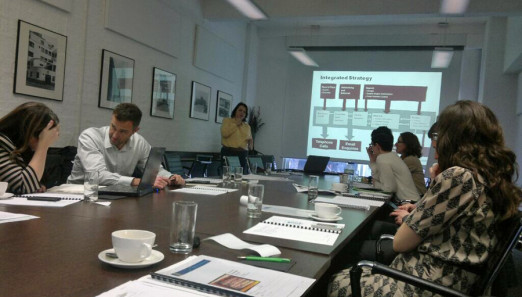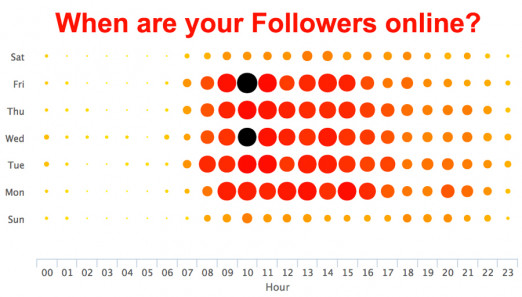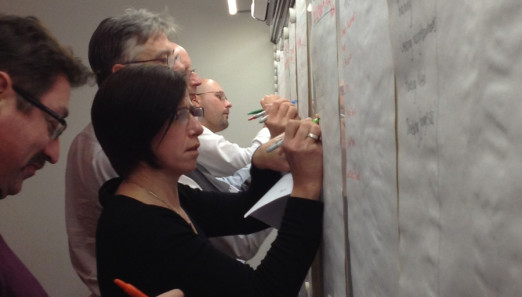According to the CMI, 44% of Architects interviewed use Twitter to help them in their work. Sounds a little implausible doesn’t it? Yet it comes from the excellent Construction Marketing Index 2013 produced by Competitive Advantage. This well respected piece of research involves telephone interviews with 600 construction professionals, including architects. The data on architects is included in the report ‘Architect Communication Channels 2013’.
This statistic, from a small but high quality sample, reflects a change in the use of Twitter at work by architects in the UK. In 2011, the CMI recorded that 38% of architect respondents said their employer did not allow them to use Twitter at work. Two years later that prescription has shrunk to just 8% of respondents.
So Architects are using twitter to help them in their work, and they now have permission to do so. Why is that?
Architects use Twitter To Learn
Last Summer I participated in a panel discussion on why architects use the Internet, and carried out some of my own research into my network of professional contacts using twitter too. The overwhelming impression I had was that architects use twitter to learn.
Working on the construction industry is a very demanding job, particularly with the continuing introduction of new technologies and new legislation. As an open, opt-in communication platform, Twitter makes finding out about these topics much simpler. The process is also more reliable than just using Google, because you can have conversations with credible professionals.
One of my contacts, Duncan Reed of Tekla (formerly of Balfour Beatty) told me that everything he learned about BIM came firstly from contacts and information he found on Twitter. Another, architect Elrond Burrellof Archetype pointed out that due to the sharing of information about Passivhaus online (including on twitter), prospects come to the firm knowing more about Passivhaus and have pre-educated and self-qualified themselves as clients. What a time saver!
Like many other professionals, architects can learn from each other on twitter, and from their peers across the industry. It is a knowledge-sharing network.
Architects use Twitter To Listen
Twitter currently has an estimated 15 million UK users (Source: Newsbrand/YouGov December 2013). But many of these users aren’t visibly active. Many use twitter just to listen.
Twitter is very easy to search, and many users set up search streams so they can hear what is being said about niche topics of choice, by anyone who is on Twitter.
Users are:
- listening to their peers to hear what concerns them;
- listening to their competitors to find out what they are discussing;
- searching for people discussing topics of interest;
- listening for people looking for advice on their areas of expertise.
This ability to search across the whole of twitter enables people to find fellow professionals with the expertise we need, whether or not we know them. It helps us create a community of common interest around any topic we like.
One great example of this is the way events have flourished on Twitter. Have a look at the Events category on my blog to see just a few of the events that have been covered on twitter in the past few years. Participating in events via twitter enables construction professionals to save time, money and carbon by joining directly from their desk. Those who do attend actively share online for everyone’s benefit.
It is therefore important to remember that most of the people who see your messages on twitter won’t be following you, and you may not know until they ring you up or send you an enquiry.
Like many other construction professionals, architects can understand what is happening in the industry using twitter, quickly and effectively.
Architects use Twitter to develop relationships with Companies
This spring Twitter carried out some research that showed that users in the UK are more likely to purchase from companies they have followed on twitter,
‘…As many as 72% of SME followers are likely to go on and purchase from the business after following it on Twitter… The research also found that SME followers are more likely to be engaged, become advocates and recommend a company to their friends.’
Twitter is using this research to demonstrate the value of twitter for SME’s (small businesses), which make up the vast proportion of construction businesses in the UK.
Twitter creates a level playing field for companies, where smaller firms can punch above their weight and demonstrate the quality of their service and expertise alongside the big boys. Of course as a consultant I know first hand how twitter can gain business for a small business, but many of my clients are finding that twitter drives more traffic to their website, gives a human face to their business and provides a practical, cost effective way for them to develop a good reputation and be found by specifiers and other customers.
How to Use Twitter for your Construction Business
Twitter works particularly well for individuals, especially if they work in a team with colleagues, advocates and existing clients. It offers a huge opportunity for both the sole practitioner and the sales team to reach customers more easily and develop credibility as individuals, and for the benefits of the business.
If you’re interested in learning how to use twitter for business, I’m running a workshop specifically for individual construction professionals at The Building Centre on 29th April. The workshop is suitable fore newcomers to twitter and for more seasoned users who want to learn more and develop a strategy for using twitter. Find out more and book on the workshop page here.
Su Butcher
 Su Butcher works with construction companies to enable them to integrate social tools and other Internet activity for business benefits. Trained in Architecture at the University of Liverpool, she has extensive experience working with architects in business. Su is currently working with The Building Centre to deliver a series of Training Workshops from February 2015.
Su Butcher works with construction companies to enable them to integrate social tools and other Internet activity for business benefits. Trained in Architecture at the University of Liverpool, she has extensive experience working with architects in business. Su is currently working with The Building Centre to deliver a series of Training Workshops from February 2015.
.jpg)

.jpg)


